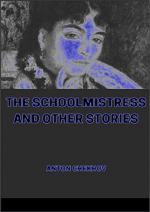A hubbub arose. Vassilyev was frightened and turned pale. In the next room there was the sound of bitter, genuine weeping, as though of someone insulted. And he realized that there were real people living here who, like people everywhere else, felt insulted, suffered, wept, and cried for help. The feeling of oppressive hate and disgust gave way to an acute feeling of pity and anger against the aggressor. He rushed into the room where there was weeping. Across rows of bottles on a marble-top table he distinguished a suffering face, wet with tears, stretched out his hands towards that face, took a step towards the table, but at once drew back in horror. The weeping girl was drunk.
As he made his way though the noisy crowd gathered about the fair man, his heart sank and he felt frightened like a child; and it seemed to him that in this alien, incomprehensible world people wanted to pursue him, to beat him, to pelt him with filthy words.... He tore down his coat from the hatstand and ran headlong downstairs.
V
Leaning against the fence, he stood near the house waiting for his friends to come out. The sounds of the pianos and violins, gay, reckless, insolent, and mournful, mingled in the air in a sort of chaos, and this tangle of sounds seemed again like an unseen orchestra tuning up on the roofs. If one looked upwards into the darkness, the black background was all spangled with white, moving spots: it was snow falling. As the snowflakes came into the light they floated round lazily in the air like down, and still more lazily fell to the ground. The snowflakes whirled thickly round Vassilyev and hung upon his beard, his eyelashes, his eyebrows.... The cabmen, the horses, and the passers-by were white.
“And how can the snow fall in this street!” thought Vassilyev. “Damnation take these houses!”
His legs seemed to be giving way from fatigue, simply from having run down the stairs; he gasped for breath as though he had been climbing uphill, his heart beat so loudly that he could hear it. He was consumed by a desire to get out of the street as quickly as possible and to go home, but even stronger was his desire to wait for his companions and vent upon them his oppressive feeling.
There was much he did not understand in these houses, the souls of ruined women were a mystery to him as before; but it was clear to him that the thing was far worse than could have been believed. If that sinful woman who had poisoned herself was called fallen, it was difficult to find a fitting name for all these who were dancing now to this tangle of sound and uttering long, loathsome sentences. They were not on the road to ruin, but ruined.
“There is vice,” he thought, “but neither consciousness of sin nor hope of salvation. They are sold and bought, steeped in wine and abominations, while they, like sheep, are stupid, indifferent, and don’t understand. My God! My God!”




